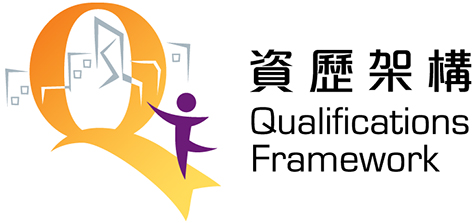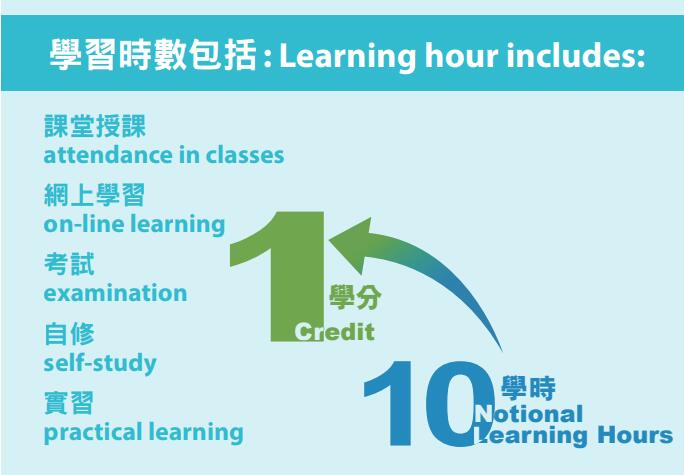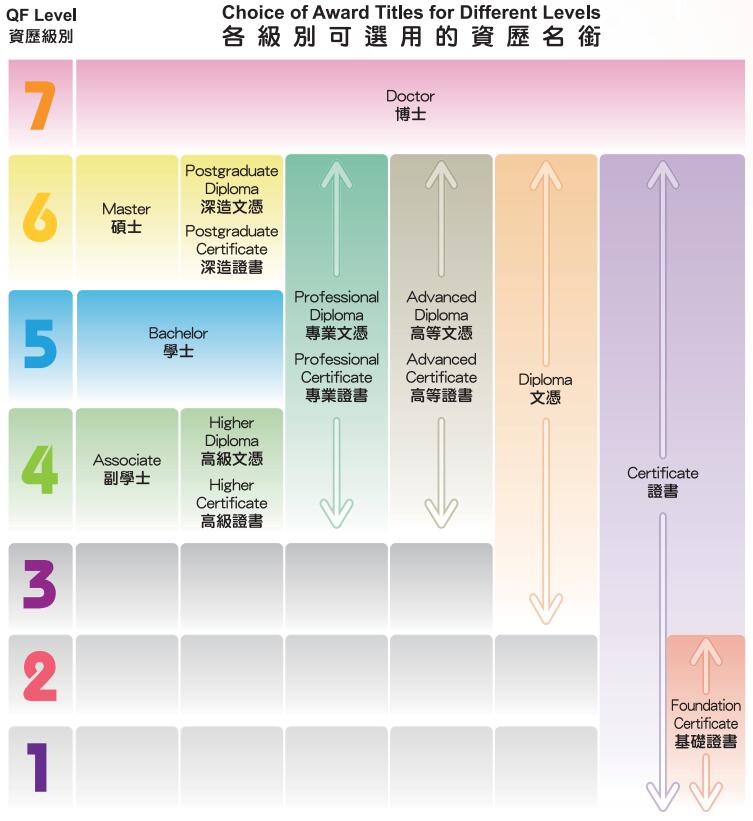HKQF - 香港資歷架構的簡介

設立資歷架構之目的
設立資歷架構的首要目的是推動終身學習,以期在日趨全球化和著重知識的經濟下,持續提升本港工作人口的質素、專業水平及競爭力。
上述目的將透過以下途徑實現:
- 為學術、職業專才及持續教育和培訓界別的資歷釐定明確及客觀的標準;
- 確保進修人士所獲得的資歷及其相應學習課程的質素;及
- 拉近學習成果與行業需求的相關性。
法律框架
立法會於2007年頒布的《學術及職業資歷評審條例》(香港法例第592章)為設立資歷架構及其相關質素保證機制提供法律框架。法例於2008年5月5日全面生效,香港資歷架構即正式推行。
管治及行政
香港特別行政區政府教育局負責制定資歷架構的政策、策略及發展方向。教育局於2009年6月成立資歷架構秘書處(簡稱秘書處)作為其執行單位,負責建構、推行及宣傳資歷架構。
資歷級別
香港資歷架構內,每項資歷均標明一個級別,表明其在框架中相對於其他資歷的定位。每一項資歷的級別乃按照一套《資歷級別通用指標》去釐定。《資歷級別通用指標》按四個範疇分別說明由一至七級每級所應達到的成效
標準,這四個範疇為:
(a) 知識及智能;
(b) 過程;
(c) 自主性及問責性;及
(d) 溝通、資訊及通訊科技及運算。
為提高《資歷級別通用指標》內文字表達的清晰度及易用程度,教育局於2017年就級別指標進行檢討,並製作實務指引,供僱主、教育及培訓機構、人力資源管理和制訂標準的相關機構作參考。
資歷學分
資歷學分量度資歷的學習量,是資歷架構的「通用貨幣」。透過資歷學分,學員可了解完成學習並達到相關資歷的學習成果而需付出的努力及時間。
資歷學分表示學習時數(即學時)。在資歷架構下,一個資歷學分相當於十個學時,而學時的計算以一般學員在所有學習模式下可能需要的時間作考慮,包括上課、導修課、實驗、工作坊實習、在圖書館或家中自學,以及評估或考試等。有關資歷學分的概念及原則,以及釐定學分和評估的實用指引,請參閱資歷架構網站所載的「資歷學分應用指引」。

資歷名銜
資歷名銜計劃旨在規範資歷架構認可的資歷在名稱方面的使用,以增加資歷的透明度及反映其資歷級別,並根據下圖所示的級別及學分去區別不同課程及資歷。

學分累積及轉移
為進一步支援學員的進階路徑,教育局亦積極鼓勵教育及培訓機構發展其「學分累積及轉移」制度,並制訂《學分累積及轉移:政策、原則及應用指引》小冊子,供有意採用的教育及培訓機構參考。
資歷架構的不同級別有什麼分別?
證書、文憑課程多數都分為不同級別,究竟不同級別有什麼分別?
資歷架構1-7級是一套用於評估和分類個人職業水平的指標體系。以下是每個級別的介紹:
資歷級別 1️⃣
. 展現一般和基礎知識,應用於有限範圍的學習或工作領域。
. 在熟悉、個人或日常環境下,使用基本智能。
. 執行有限範圍的簡單工序,處理數據,取得資訊。
. 使用基本工具和材料,解決問題。
資歷級別 2️⃣
. 應用基礎事實知識或實務知識於學習或工作領域。
. 在熟悉環境下,運用各種智能。
. 解決問題,應用基本工具和材料,完成例行程序。
. 在文件中指出重點,以書面及口頭形式作簡單的溝通回應。
資歷級別 3️⃣
. 應用廣泛的實務及理論知識於某學習或工作領域。
. 在熟悉但偶然陌生的環境下,運用各類智能。
. 組織、評估資訊,解決各類問題。
. 在熟悉的環境下,進行自主工作。
資歷級別 4️⃣
. 應用廣泛的知識根柢及若干專門知識於學習或工作領域。
. 運用與某科目有關的多類智能,包括專門能力。
. 呈報、評估資訊,進行常規的資料搜集和數據分析。
. 在不同環境下,從事技術工作,進行恰當的判斷。
資歷級別 5️⃣
. 展現深層專門技術或理論知識於學習或工作領域。
. 運用多類專門智能,輔助既定工作。
. 批判分析、評估、整合構思、概念及議題。
. 處理專業工作,包括資源配置和評估。
資歷級別 6️⃣
. 展現對系統化知識體系的駕馭能力,部分涉及學習或專業實踐領域的前沿。
. 運用高度專門技術、研究或學術能力。
. 善用分析能力和創造力,執行複雜的工作,包括資源配置和評估。
. 以批判角度參與「批判性對話」。
資歷級別 7️⃣
. 展現對前沿知識體系的整體理解,並對其相關理論和概念有批判角度。
. 作出對學科或跨學科更廣泛關係的重大而具原創性的貢獻。
. 在應對新情況出現的問題及議題時,作出具創意及原創性的回應。
. 以批判角度評估數字和圖像數據,應用之於開發新知識和創新做法。
我們提供的證書和文憑課程,不同級別會有不同的課程內容。報讀課程前,學員可以先到我們的網站了解不同級別的課程內容,再根據自己的程度和需要揀選合適的課程!
香港資歷架構(HKQF)與國際機構合作 [HKQF的認受性]
歐洲國家:HKQF與一些歐洲國家的資歷框架進行對接,包括愛爾蘭、蘇格蘭和新西蘭,這些合作旨在促進資歷的互認和銜接,為香港的學習者提供更多的國際機會。
- HKQF與歐盟資歷框架進行對接文件(2016) 鏈結 | by HKQF Hong Kong Qualifications Framework 鏈結
- HKQF與歐盟資歷框架進行對接文件(2016) 鏈結 | by POEU Publications Office of the European Union 鏈結
- HKQF與愛爾蘭資歷框架進行對接文件(2016) 鏈結 | by QQI Quality and Qualifications Ireland 鏈結
- HKQF與蘇格蘭資歷框架進行對接文件(2017) 鏈結 | by SCQF Scottish Credit and Qualifications Framework 鏈結
- HKQF與新西蘭資歷框架進行對接文件(2018) 鏈結 | by NZQA New Zealand Qualifications Authority 鏈結
澳洲、韓國和新加坡:HKQF在2019年與這些國家深化了合作,特別是與新加坡組成聯合工作小組,研究如何對接兩地的資歷水平,進一步促進資歷的互認。
廣東省:HKQF作為參考藍本,協助廣東省建立當地的資歷水平,這顯示了香港與中國大陸在資歷認可方面的合作潛力,特別是在大灣區的人才流動方面。
資料來源:
- 資歷架構秘書處及評審局:質素保證機制 資歷架構的基石 QF與QA 同步邁向國際化 - 香港資歷架構 - QF in Action | EDUplus.hk
- HKCAAVQ_AR20-21
- 學習旅途多元路向 資歷架構HKQF 塑造清晰進階路徑 - GoodSchool
資料更新: 11JAN2025
